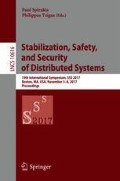Abstract
We investigate self-stabilizing rendezvous algorithms for two synchronous mobile agents. The rendezvous algorithms make two mobile agents meet at a single node, starting from arbitrary initial locations and arbitrary initial states. We study deterministic algorithms for two synchronous mobile agents with different labels but without using any whiteboard in the graph. First, we show the existence of a self-stabilizing rendezvous algorithm for arbitrary graphs by providing a scheme to transform a non-stabilizing algorithm to a self-stabilizing one. However, the time complexity of the resultant algorithm is not bounded by any function of the graph size and labels. This raises the question whether there exist polynomial-time self-stabilizing rendezvous algorithms. We give partial answers to this question. We give polynomial-time self-stabilizing rendezvous algorithms for trees and rings.
This work was supported by JSPS KAKENHI Grant Numbers 26280022 and 26330084.
Notes
- 1.
Some algorithms in literature may be actually self-stabilizing. However, since their self-stabilizing property is not proven explicitly, we regard them as non-stabilizing algorithms.
References
Blin, L., Potop-Butucaru, M.G., Tixeuil, S.: On the self-stabilization of mobile robots in graphs. In: Proceedings of 15th International Conference on Principles of Distributed systems, pp. 301–314 (2007)
Bouchard, S., Dieudonné, Y., Ducourthial, B.: Byzantine gathering in networks. Distrib. Comput. 29(6), 435–457 (2016)
Chalopin, J., Dieudonné, Y., Labourel, A., Pelc, A.: Rendezvous in networks in spite of delay faults. Distrib. Comput. 29, 187–205 (2016)
Czyzowicz, J., Kosowski, A., Pelc, A.: How to meet when you forget: log-space rendezvous in arbitrary graphs. Distrib. Comput. 25(2), 165–178 (2012)
Czyzowicz, J., Kosowski, A., Pelc, A.: Time versus space trade-offs for rendezvous in trees. Distrib. Comput. 27(2), 95–109 (2014)
D’Angelo, G., Navarra, A., Nisse, N.: A unified approach for gathering and exclusive searching on rings under weak assumptions. Distrib. Comput. 30(1), 17–48 (2017)
D’Angelo, G., Stefano, G.D., Navarra, A.: Gathering on rings under the look-compute-move model. Distrib. Comput. 27(4), 255–285 (2014)
Dessmark, A., Fraigniaud, P., Kowalski, D.R., Pelc, A.: Deterministic rendezvous in graphs. Algorithmica 46, 69–96 (2006)
Dieudonné, Y., Pelc, A., Peleg, D.: Gathering despite mischief. ACM Tran. Algorithms 11(1), 1:1–1:28 (2014)
Dieudonné, Y., Petit, F.: Self-stabilizing gathering with strong multiplicity detection. Theoret. Comput. Sci. 428, 47–57 (2012)
Dijkstra, E.W.: Self-stabilizing systems in spite of distributed control. Commun. ACM 17(11), 643–644 (1974)
Fraigniaud, P., Pelc, A.: Delays induce an exponential memory gap for rendezvous in trees. ACM Trans. Algorithms 9(2), 17:1–17:24 (2013)
Klasing, R., Markou, E., Pelc, A.: Gathering asynchronous oblivious mobile robots in a ring. Theoret. Comput. Sci. 390, 27–39 (2008)
Kowalski, D.R., Malinowski, A.: How to meet in anonymous network. Theoret. Comput. Sci. 399, 141–156 (2008)
Masuzawa, T., Tixeuil, S.: Quiescence of self-stabilizing gossiping among mobile agents in graphs. Theoret. Comput. Sci. 411(14–15), 1567–1582 (2010)
Pelc, A.: Deterministic rendezvous in networks: a comprehensive survey. Networks 59, 331–347 (2012)
Pelc, A.: Deterministic gathering with crash faults. CoRR abs/1704.08880 (2017). http://arxiv.org/abs/1704.08880
Suzuki, I., Yamashita, M.: Distributed anonymous mobile robots: formation of geometric patterns. SIAM J. Comput. 28(4), 1347–1363 (1999)
Ta-Shma, A., Zwick, U.: Deterministic rendezvous, treasure hunts, and strongly universal exploration sequences. ACM Trans. Algorithms 10(3), 12:1–12:15 (2014)
Tsuchida, M., Ooshita, F., Inoue, M.: Byzantine gathering in networks with authenticated whiteboards. In: Proceedings of 11th International Conference and Workshops on Algorithms and Computation, pp. 106–118 (2017)
Author information
Authors and Affiliations
Corresponding author
Editor information
Editors and Affiliations
Rights and permissions
Copyright information
© 2017 Springer International Publishing AG
About this paper
Cite this paper
Ooshita, F., Datta, A.K., Masuzawa, T. (2017). Self-stabilizing Rendezvous of Synchronous Mobile Agents in Graphs. In: Spirakis, P., Tsigas, P. (eds) Stabilization, Safety, and Security of Distributed Systems. SSS 2017. Lecture Notes in Computer Science(), vol 10616. Springer, Cham. https://doi.org/10.1007/978-3-319-69084-1_2
Download citation
DOI: https://doi.org/10.1007/978-3-319-69084-1_2
Published:
Publisher Name: Springer, Cham
Print ISBN: 978-3-319-69083-4
Online ISBN: 978-3-319-69084-1
eBook Packages: Computer ScienceComputer Science (R0)

